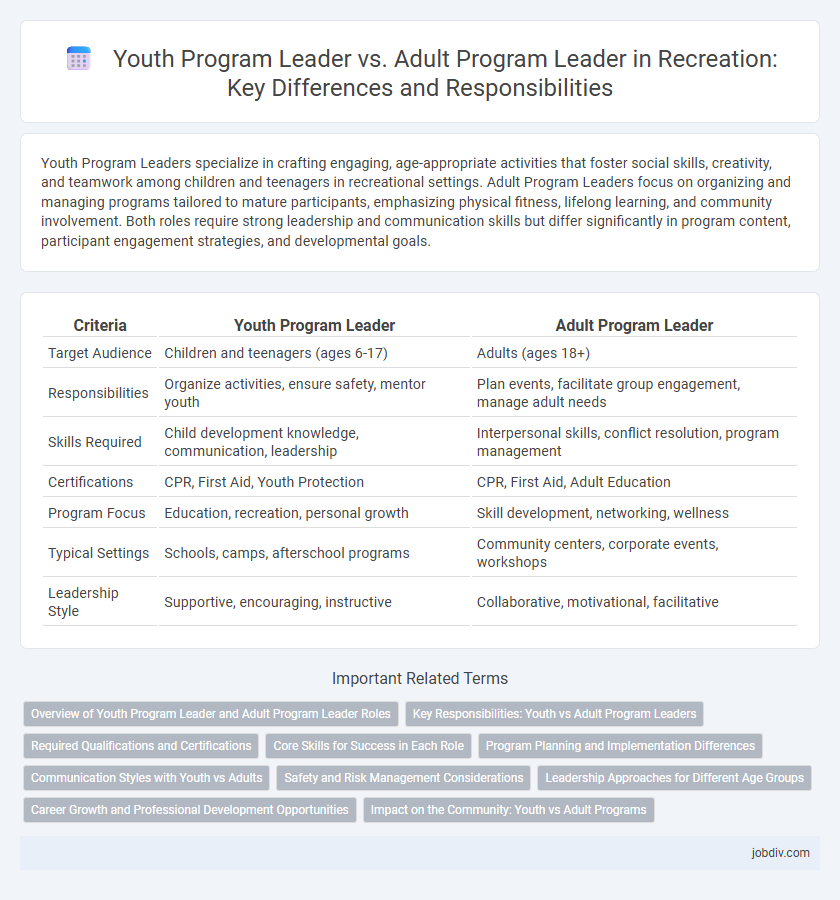Youth Program Leaders specialize in crafting engaging, age-appropriate activities that foster social skills, creativity, and teamwork among children and teenagers in recreational settings. Adult Program Leaders focus on organizing and managing programs tailored to mature participants, emphasizing physical fitness, lifelong learning, and community involvement. Both roles require strong leadership and communication skills but differ significantly in program content, participant engagement strategies, and developmental goals.
Table of Comparison
| Criteria | Youth Program Leader | Adult Program Leader |
|---|---|---|
| Target Audience | Children and teenagers (ages 6-17) | Adults (ages 18+) |
| Responsibilities | Organize activities, ensure safety, mentor youth | Plan events, facilitate group engagement, manage adult needs |
| Skills Required | Child development knowledge, communication, leadership | Interpersonal skills, conflict resolution, program management |
| Certifications | CPR, First Aid, Youth Protection | CPR, First Aid, Adult Education |
| Program Focus | Education, recreation, personal growth | Skill development, networking, wellness |
| Typical Settings | Schools, camps, afterschool programs | Community centers, corporate events, workshops |
| Leadership Style | Supportive, encouraging, instructive | Collaborative, motivational, facilitative |
Overview of Youth Program Leader and Adult Program Leader Roles
Youth Program Leaders specialize in developing and implementing recreational activities tailored to children and teenagers, prioritizing safety, engagement, and skill-building in a structured environment. Adult Program Leaders focus on organizing diverse programs for individuals aged 18 and above, emphasizing social interaction, wellness, and lifelong learning. Both roles require strong leadership, communication skills, and the ability to adapt activities to meet the unique needs of their target age groups.
Key Responsibilities: Youth vs Adult Program Leaders
Youth Program Leaders specialize in developing engaging activities that foster social, emotional, and physical growth in children and teenagers, ensuring a safe and supportive environment. Adult Program Leaders focus on organizing educational workshops, fitness sessions, and community events tailored to adult participants' interests and needs. Both roles require skill in group management, but Youth Leaders emphasize mentorship and developmental support, while Adult Leaders prioritize facilitation and skill-building.
Required Qualifications and Certifications
Youth Program Leaders typically require certifications in CPR, First Aid, and child development, emphasizing skills in youth engagement and behavior management, while Adult Program Leaders often need credentials in adult education, group facilitation, and specialized program areas. Both roles demand strong communication abilities and a background check, but Youth Program Leaders prioritize experience working with minors, and Adult Program Leaders focus on adult learning principles and leadership qualifications. These distinctions ensure that each leader meets the specific safety, educational, and developmental needs of their target age group.
Core Skills for Success in Each Role
Youth Program Leaders excel in communication, empathy, and conflict resolution to effectively engage young participants and foster a supportive environment. Adult Program Leaders require advanced organizational skills, leadership experience, and strategic planning abilities to manage diverse adult groups and coordinate complex activities. Both roles demand adaptability and teamwork, but the emphasis shifts from nurturing development in youth to facilitating collaboration and goal achievement among adults.
Program Planning and Implementation Differences
Youth Program Leaders tailor activities to engage children and teenagers, focusing on age-appropriate skill development and interactive learning experiences. Adult Program Leaders emphasize facilitating discussion, promoting leadership, and providing enrichment opportunities suited to mature participants' interests and needs. Program planning for youth involves more structured supervision and creative elements, whereas adult programs prioritize flexibility and participant-driven content.
Communication Styles with Youth vs Adults
Youth Program Leaders employ interactive and engaging communication styles, using clear, simple language and visual aids to connect with younger participants effectively. Adult Program Leaders prioritize respectful dialogue, active listening, and detailed explanations that acknowledge the experiences and expertise of adult participants. Both roles adapt their communication to foster positive interactions and encourage participation tailored to the developmental needs of their audiences.
Safety and Risk Management Considerations
Youth Program Leaders require specialized training in child development and supervision to effectively manage safety risks unique to minors, such as higher vulnerability to injuries and supervision challenges. Adult Program Leaders focus on risk management strategies tailored to adult participants, including managing pre-existing health conditions and promoting self-responsibility in safety practices. Both roles necessitate comprehensive emergency protocols and continuous risk assessments to ensure a secure recreational environment.
Leadership Approaches for Different Age Groups
Youth Program Leaders employ dynamic, interactive leadership approaches that emphasize engagement, creativity, and skill-building to foster development and confidence in younger participants. Adult Program Leaders utilize collaborative and facilitative leadership styles, focusing on shared decision-making, empowerment, and social interaction to address the diverse needs and autonomy of adult participants. Tailoring leadership methods to age-specific cognitive and emotional development enhances program effectiveness and participant satisfaction across youth and adult recreation activities.
Career Growth and Professional Development Opportunities
Youth Program Leaders gain specialized skills in youth engagement, leadership development, and conflict resolution, fostering a strong foundation for careers in education, social work, or youth services. Adult Program Leaders develop expertise in adult education, program management, and community outreach, opening pathways to roles in workforce training, nonprofit management, or health and wellness coordination. Both roles offer professional development through certifications, workshops, and networking, with growth often accelerated by gaining experience in diverse program settings and pursuing advanced credentials.
Impact on the Community: Youth vs Adult Programs
Youth Program Leaders foster community growth by engaging young participants in skill-building, leadership development, and social interaction, creating a foundation for future civic involvement. Adult Program Leaders enhance community well-being through targeted activities that promote lifelong learning, health, and social cohesion among mature demographics. Both roles significantly impact community resilience, but youth programs often generate long-term societal benefits by shaping the next generation's values and capabilities.
Youth Program Leader vs Adult Program Leader Infographic

 jobdiv.com
jobdiv.com